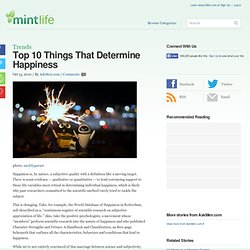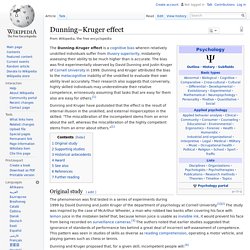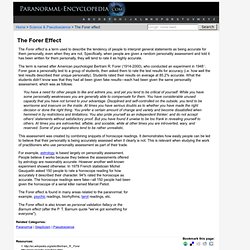

Computer Science. Cybernetics. Societal Studies. Anthropology. Sociology. Brain and Physiological Psychology. Psychology of Behavior. Psychology Studies. Psychology. The Brain. Free Ebooks. Mental Health. Sleeping/Dreaming. Derekn. Other. Interesting. The Relativity of Wrong by Isaac Asimov. By Isaac Asimov I received a letter from a reader the other day.

It was handwritten in crabbed penmanship so that it was very difficult to read. Nevertheless, I tried to make it out just in case it might prove to be important. In the first sentence, he told me he was majoring in English Literature, but felt he needed to teach me science. (I sighed a bit, for I knew very few English Lit majors who are equipped to teach me science, but I am very aware of the vast state of my ignorance and I am prepared to learn as much as I can from anyone, however low on the social scale, so I read on.) Einstein. Physcology.
Color Psychology. By David Johnson Like death and taxes, there is no escaping color.

It is ubiquitous. Yet what does it all mean? Why are people more relaxed in green rooms? Why do weightlifters do their best in blue gyms? Colors often have different meanings in various cultures. Black Black is the color of authority and power. White Brides wear white to symbolize innocence and purity. Red The most emotionally intense color, red stimulates a faster heartbeat and breathing. The most romantic color, pink, is more tranquilizing. Blue The color of the sky and the ocean, blue is one of the most popular colors. Green Currently the most popular decorating color, green symbolizes nature. Yellow Cheerful sunny yellow is an attention getter. Purple. Peter Principle. An illustration visualizing the Peter principle The Peter Principle is a concept in management theory in which the selection of a candidate for a position is based on the candidate's performance in his or her current role rather than on abilities relevant to the intended role.

Thus, employees only stop being promoted once they can no longer perform effectively, and "managers rise to the level of their incompetence. " Top 10 Things That Determine Happiness. Photo: meddygarnet Happiness is, by nature, a subjective quality with a definition like a moving target.

There is scant evidence — qualitative or quantitative — to lend convincing support to those life variables most critical in determining individual happiness, which is likely why past researchers committed to the scientific method rarely tried to tackle the subject. Dunning–Kruger effect. The Dunning–Kruger effect is a cognitive bias wherein relatively unskilled individuals suffer from illusory superiority, mistakenly assessing their ability to be much higher than is accurate.

The bias was first experimentally observed by David Dunning and Justin Kruger of Cornell University in 1999. Dunning and Kruger attributed the bias to the metacognitive inability of the unskilled to evaluate their own ability level accurately. Their research also suggests that conversely, highly skilled individuals may underestimate their relative competence, erroneously assuming that tasks that are easy for them also are easy for others.[1] Dunning and Kruger have postulated that the effect is the result of internal illusion in the unskilled, and external misperception in the skilled: "The miscalibration of the incompetent stems from an error about the self, whereas the miscalibration of the highly competent stems from an error about others.
Watch Free Documentaries Online. 15 styles of Distorted Thinking. 15 styles of Distorted Thinking Filtering: You take the negative details and magnify them while filtering out all positive aspects of a situation.

Polarized Thinking: Things are black or white, good or bad. You have to be perfect or you're a failure. There is no middle ground. The Forer Effect. The Forer effect is a term used to describe the tendency of people to interpret general statements as being accurate for them personally, even when they are not.

Specifically, when people are given a random personality assessment and told it has been written for them personally, they will tend to rate it as highly accurate. The term is named after American psychologist Bertram R. Forer (1914-2000), who conducted an experiment in 1948. Forer gave a personality test to a group of students, then asked them to rate the test results for accuracy (i.e. how well the test results described their unique personality). Students rated their results on average at 85.2% accurate. Eight Ways to Spot Emotional Manipulation.
15 Styles of Distorted Thinking. Physcology. Reference Tools. DIY: Do It Yourself Sites. Search and Metasearch Engines. DIY Electronics. Hobby Electronics. Movies I Like. Job Search Sites. Career Reference Sites. Found By Internet Wandering. Free Software Sites. Ars Technica. Wired.com. Technology News. Technology News - CNET News. Gizmodo, the Gadget Guide. Building Computers. 10 Psychological States You've Never Heard Of — And When You Experienced Them.
Mrjdale. Psychology. The existential quest of psychological science for its soul. Psychology Studies. Psych Publications. Pseudoscience: Science Errors, Conflicts & Frauds. Science Errors & Conflicts. Lone science bloggers. Innovation. Improving Communication. Knowledge. Intrinsic & extrinsic. Insightful Stuff. Lectures & inspiration. Cancer. Skin Repair. Future Of... Exceptional TED Lectures.
Be The Change... Global Theories. Biomedical Registries. Human. Inspiration. Steve jobs. Philosophical Talks. TED talks.
Psychology. Uplink. History. Thought on Thinking. Comprehensive Sites. Social Studies. Encyclopedias. Rhetorics/Storytelling/Presentation skills. History. Movies. Quotes. Persuassion/Con/Psychological Manipulation/Lies. Games. Quotes. Musician pearls. Serious Games Examples. Software. Action & Shooter. Bad-Ass Quotes. Science & Mathematics. Vs. the World. World History. FIND.